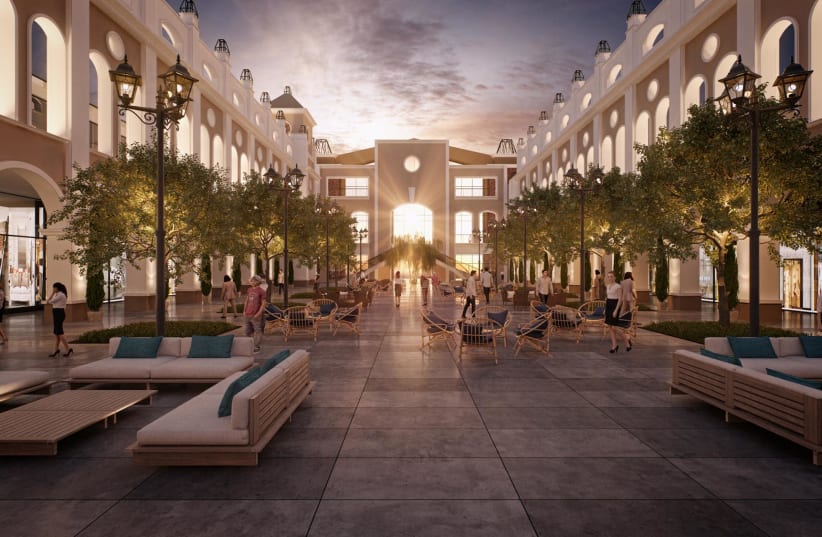Israel’s largest and fanciest design mall, with a piazza designed as a replica of the famous Venice Hotel in Las Vegas, is set to open in the coming weeks outside Ma’aleh Adumim, in the outskirts of Jerusalem.
Many of Israel’s largest home design retailers and restaurants are ready to open their shops there later in the month, with high expectations.
Meanwhile, others wonder whether building the largest design mall in a Middle East desert, over the Green Line, can be a viable project. If you build it outside populated areas, will they still come?
D City is the latest project to be launched by the Kass Investment Group, which specializes in setting up boutique complexes in the countries of Israel and Georgia. More than a billion shekels have been invested in the mall, which has about 100,000 meters of space, including a luxury hotel, an artificial indoor sky, a forum for designers, and some 200 storefronts, designed by celebrity architect Gadi Halperin. The mall was recently used as the set for the video for Israel’s Eurovision Song Contest entry, Eden Alene’s “Set Me Free.”
There will be a strong focus on fine restaurants and leisure activities, including Monday night concerts. A massive indoor amusement park is also planned for the future. In short, D City is expected to elevate the mall experience to new levels never before seen in Israel.
According to the mall’s promotional materials, 1.5 million people live within a 35-minute drive, and 75% of those will visit the mall at least once a month, creating a strong economic center on the outskirts of the capital. As many as 20 million visitors a year have been projected.
Advocates of the project say that Jerusalemites have increasingly grown accustomed to leaving the city for shopping, and that the new road toward Ma’aleh Adumim and low traffic congestion will make it an ideal place for a day out shopping. Its location on a major route toward the Dead Sea and Negev will also make it an essential stop for vacationers, they say.
“I expect that this mall will provide great exposure to a crowd that doesn’t generally know us,” said Eli Bell, branch manager of the Tel Aviv-based Meatos group, which plans to open two restaurants in the new mall. “Once corona is over, we hope this will attract visitors coming from around Israel and abroad on their way to Eilat and other vacation destinations.
“I think some people may be scared to make the trip the first time, but once they see it, they’ll want to come back,” he said.
NOT EVERYONE thinks that will be the case, however.
“I would guess that this mall will mainly service people in Ma’aleh Adumim and small towns nearby like Mitzpe Yeriho, but people are unlikely to leave Jerusalem or other central places to go to a mall in Ma’aleh Adumim,” said Dr. Naomi Hausman, an economics professor at the Hebrew University of Jerusalem.
She speculated that the location of the mall, just over the Green Line in areas captured by Israel during the 1967 Six Day War, was chosen for political, not economic, considerations. “If that’s the case, it is set up for failure – because it would be ignoring market considerations.
“The best way for the government to encourage growth is to allow developers to build where they think it is most economically viable, not where the government wants them to,” Hausman said.
“Israel has long had a policy of encouraging development in periphery areas, as do several long, skinny countries like Chile and some Scandinavian nations, but if you look at the economic costs and benefits, as opposed to the political ones, that’s generally not a winning policy,” she said. “Building in dense areas like the Center isn’t more expensive. It has considerable benefits because density increases productivity.”
But the Kass Group, headed by Orthodox Jew Hanoch Kass, seems to know what it is doing, with a number of recreational and entertainment complexes, shopping malls, design centers and conference centers in its global portfolio.
The mall was built in just over two years, with a high level of quality and design that is intended to conjure images of Venice, Las Vegas and Disneyland at the same time. Rental prices for commercial space are said to be surprisingly low, one of the main factors that have helped it attract many of the largest brand names.
Will people travel to the Mishor Adumim industrial zone to check it out? The mall’s website says that opening day is July 19, so we should be finding out soon.
